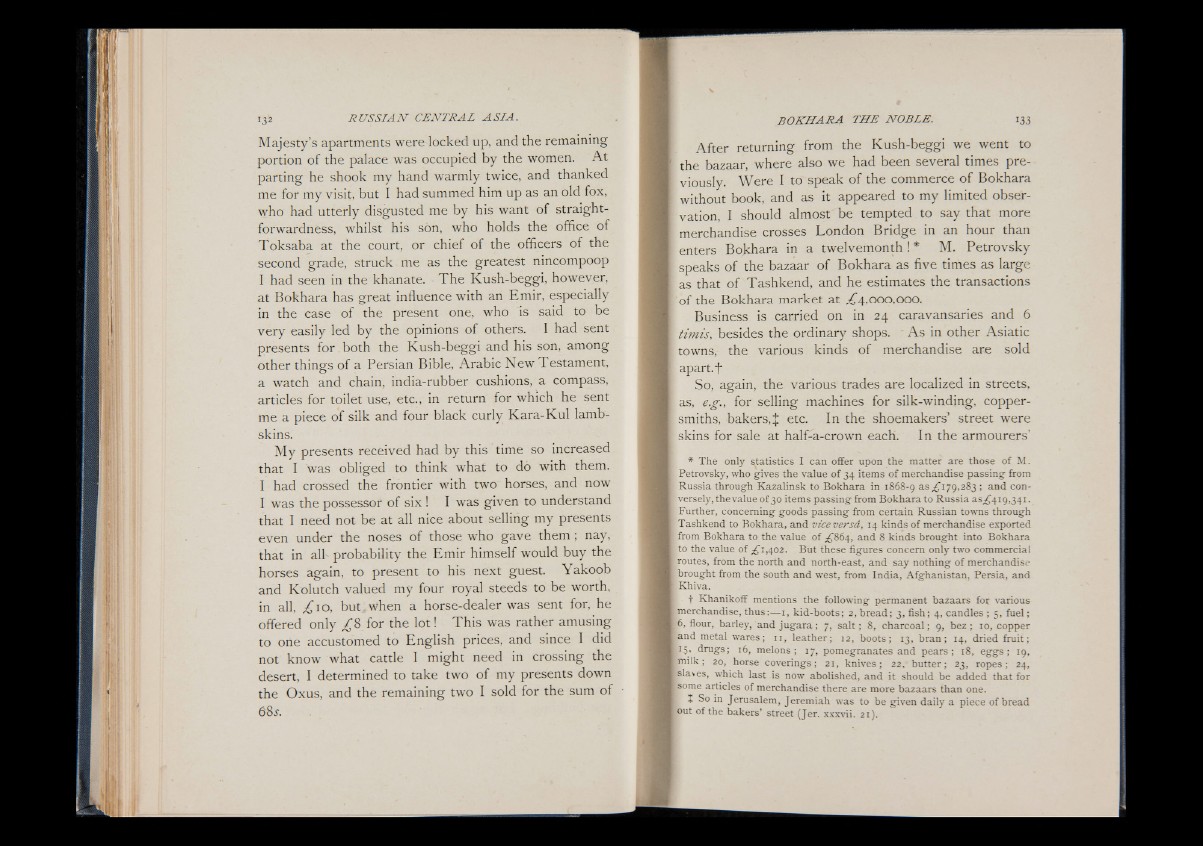
Majesty’s apartments were locked up, and the remaining
portion of the palace was occupied by the women. A t
parting he shook my hand warmly twice, and thanked
me for my visit, but I had summed him up as an old fox,
who had utterly disgusted me by his want of straightforwardness,
whilst his son, who holds the office of
Toksaba at the court, or chief of the officers of the
second grade, struck me as the greatest nincompoop
I had seen in the khanate. The Kush-beggi, however,
at Bokhara has great influence with an Emir, especially
in the case of the present one, who is said to be
very easily led by the opinions of others. I had sent
presents for both the Kush-beggi and his son, among
other things of a Persian Bible, Arabic New Testament,
a watch and chain, india-rubber cushions, a compass,
articles for toilet use, etc., in return for which he sent
me a piece of silk and four black curly Kara-Kul lambskins.
My presents received had by this time so increased
that I was obliged to think what to do with them.
I had crossed the frontier with two horses, and now
I was the possessor of six ! I was given to understand
that I need not be at all nice about selling my presents
even under the noses of those who gave them; nay,
that in alh probability the Emir himself would buy the
horses again, to present to his next guest. Yakoob
and Kolutch valued my four royal steeds to be worth,
in all, £ \o , but.when a horse-dealer was sent for, he
offered only £ 8 for the lo t ! This was rather amusing
to one accustomed to English prices, and since I did
not know what cattle I might need in crossing the
desert, I determined to take two of my presents down
the Oxus, and the remaining two I sold for the sum of
6'8i.
After returning from the Kush-beggi we went to
the bazaar, where also we had been several times previously.
Were I to speak of the commerce o f Bokhara
without book, and as it appeared to my limited observation,
I should almost be tempted to say that more
merchandise crosses London Bridge in an hour than
enters Bojchara in a twelvemonth ! * M. Petrovsky
speaks of the bazaar of Bokhara as five times as large
as that of Tashkend, and he estimates the transactions
of the Bokhara market at ,¿4,000,000.
Business is carried on in 24 caravansaries and 6
timis, besides the ordinary shops. As in other Asiatic
towns, the various kinds of merchandise are sold
apart, t
So, again, the various trades are localized in streets,
as, e.g., for selling machines for silk-winding, coppersmiths,
bakers, J etc. In the shoemakers’ street were
skins for sale at half-a-crown each. In the armourers’
* The only statistics I can offer upon the matter are those of M.
Petrovsky, who gives the value of 34 items of merchandise passing from
Russia through Kazalinsk to Bokhara in 1868-9 as ^179,283 ; and conversely,
the value of 30 items passing from Bokhara to Russia as^'419,341.
Further, concerning goods passing from certain Russian towns through
Tashkend to Bokhara, and vice versa, 14 kinds of merchandise exported
from Bokhara to the value of ^864, and 8 kinds brought into Bokhara
to the value of ^1,402. But these figures concern only two commercial
routes, from the north and north-east, and say nothing of merchandise
brought from the south and west, from India, Afghanistan, Persia, and
; Khiva.
t Khanikoff mentions the following permanent bazaars for various
merchandise, thus:— 1, kid-boots; 2, bread; 3, fish; 4 , candles ; 5, fuel;
[6, flour, barley, and jugara; 7, salt; 8, charcoal; 9, bez; 10, copper
rand metal wares; 11, leather; 12, boots; 13, bran; 14, dried fruit;
¡15, drugs; 16, melons ; 17, pomegranates and pears ; 18, eggs ; 19,
milk; 20, horse coverings; 21, knives; 22, butter; 23, ropes; 24,
slaves, which last is now abolished, and it should be added that for
some articles of merchandise there are more bazaars than one.
j I So in Jerusalem, Jeremiah was to be given daily a piece of bread
out of the bakers’ street (Jer. xxxvii. 21).